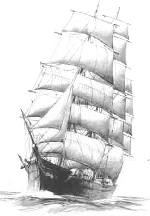
Article supplied by - Gerry's Great Great Grandfather, Robert LINTON was manager on Glenronald & Brie Brie stations near Glenthompson in the western district of Victoria from 1865 until he went to New Zealand in 1872 with James Glenny Wilson to establish a station there.
Gerry Linton, Courtenay, British Columbia, Canada (On Vancouver Island)
Email - gerryshirl@telus.net
a Reminiscence by Robert Linton
Forty-two years ago to-day I left the home land to come out to Australia, having got a job to help to look after a shipment of Lincoln and Border Leicester sheep that were being brought out to a station in the Western District of Victoria. I joined the ship at "Grays," a village on the Thames, where the sheep had been housed for some weeks accustoming them to hand feeding. The ship went down to Gravesend at night, when we put the sheep on a barge, which was to float down with the tide in the morning, and so transferred on board ship. We went to bed, the bargee promising to call us before he started, but, over-sleeping, he let go, and sent a message for us to follow along the river bank till we caught him up. After walking a mile or two, the boat was sent ashore to us, where it was over the boot-tops in mud. So that I sailed from nowhere in particular, only sometimes I can smell that mud yet. We had about 100 sheep in our lot, which were all housed on deck in a very confined space, many of the alley-ways being so low and narrow we had to crawl on hands and knees to feed and water the sheep. The sheep did very well until we got in the tropics, having plenty of roots, but on reaching the warm zone what was left of the roots rotted, the only fodder left being dry, but in a great variety, so that things I believe would have still gone all right only the water was restricted. The agreement was that the sheep-owners were to supply the fodder and the ship the water in sufficient quantity. The skipper's idea was a very restricted one, possibly by never using any himself, at least inwardly. The manager in charge talked, begged, and tried to buy, but no more than a pint a day for each sheep could be got. When one or two of the sheep died the manager tried to get the doctor to say it was for want of water, but he did not see much use in water to sustain life either, and things got very bad, one or two dying every day. But just in the nick of time we got a breeze which took us out of the tropics, and good rains fell, and the sheep houses being covered with canvas we claimed all that fell there, and got a good supply, and reached Melbourne with about 75 percent of the sheep alive. But it was otherwise with another lot of about 100 Rambouillets, mostly rams. They were placed 'tween decks, with only an apology for wind sails or ventilation. To make matters worse there was no one in charge, the consignee having a contract with the ship to supply everything, as well as attendance. The attendant was the ship's butcher, and I can faithfully say he worked like a Trojan, and talked to the captain and doctor, and even got the length of getting them down to see and feel what the place felt like. I used to go down to help the butcher, he having been good to us at the start when sea-sick. Since then I have been in some hot places, but that still takes the cake in my memory. The result was that less than twenty Rambouillets were landed. The shippers made a mistake in sending them out with more than full fleece. I suppose with the idea they would sell better on landing. The Rambouillets' owner brought an action for damages, and I had to go twice as a witness, but there was no result. After the appeal was lodged, and before it was tried at home, I heard the captain had to be put in a lunatic asylum. The owners, the caretakers, and the sheep, where are they today? The owners are gone, the caretakers are scattered far, and so is the progeny of the sheep. Some are in New Zealand, the balance scattered over the Western District of Victoria, and perhaps further still.From "The Pastoralists' Review" dated June 15, 1907
Under the above article it had a photograph of Robert LINTON with the following caption:
Mr. Robert LINTON, of New Zealand, has had an interesting career, and we have much pleasure in reproducing his photograph and a few reminiscences of old times by himself. He is now eighty-four years of age, and wonderfully active. In 1865, when a manager for Messrs. John SANDERSON and Co., he selected and brought out to Victoria a large number of Lincoln and Border Leicester sheep. He was well known in the Western District of Victoria as manager of Bri Bri and Glenronald Stations until they were sold in 1872. He went to New Zealand in that year, and farmed near Halcombe until four years ago, when he sold his property to the Government for closer settlement. He was an active member of the Manawatu Agricultural and Pastoral Association in its early days, and was in great request as a judge of sheep at the different North Islands shows..